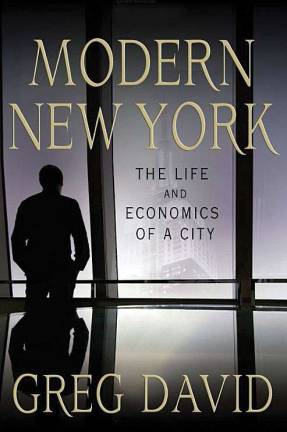The Economic Engine that Roared

Greg David examines the business of what makes New York work By Sean Creamer Knowledge of the art of business is a requirement for anyone who hopes to cover the fast-paced business world of New York. Beyond that, though, an understanding of the history and players who have made this city into what it was are also needed. Greg David, a CUNY professor, was the editor of Crain's New York Business for 25 years. He has used his experience as a business journalist to pen his recent book Modern New York: The Life and Economics of a City, a book for anyone interested in how the economic engine of the financial capital of the world works. The author will discuss his book and the future of New York City April 9 at 7 p.m. at the Barnes and Noble on Broadway and 82nd Street. West Side Spirit: What makes New York's economy unique? Greg David: Well, New York isn't just any city, it is THE city. The story of New York is the story of how this city became the preeminent business and financial capital of America, if not the world. And it's a fascinating story, because it's about the triumph of Wall Street. It's about the roles mayors have had in shaping this city for good and for ill. And it's about all the efforts New York has made to diversify its economy. I think fundamentally, this book is about the intersection of business, the economy and politics. Is the book written purely for those in the business arena? The book is not just about business people, it's about all kinds of New Yorkers. One of the most important reasons why New York is prosperous is because of immigrants. People say that Ed Koch's housing plan was instrumental in saving the neighborhoods-it was a good plan, but it didn't save the neighborhoods. The arrival of immigrants in rising numbers in the late 1970s and 1980s is what saved New York. In the '70s, New York City's population decreased by almost 1 million people. We were on our way to becoming some super-sized Boston or maybe Detroit. Then immigrants moved into the worst neighborhoods, because that is where they could afford to live, and they revitalized them. Immigrants have fueled the growth of tourism; immigrants have fueled the growth of many industries. Immigrants are more entrepreneurial, they have played a crucial role in making the city more prosperous-if we are going to have a bright future, we are going to continue to need hundreds of thousands of immigrants to come to the city. How do you feel gentrification has affected some neighborhoods in New York City? What's happening in Greenpoint and Williamsburg is the manifestation of the policies of the hero of the book, whose name is Dan Doctoroff. New York was straightjacketed for many years by the myth of manufacturing; that manufacturing would make a comeback and we needed to nurture it. Doctoroff broke that myth. When he tried to bring the Olympics to New York, he went looking for where he was going to put the stadiums and housing it required. He led the effort that rezoned so much of the city and opened New York to development, where we can put the office buildings needed for the workers of the future and the residential units for the people we think are coming here. Three times, New York has approached 3.8 million jobs, and each time we have fallen back. We fell back before Wall Street crashed. We had nowhere to put the jobs, so they went to the suburbs. Doctorff's great legacy is that we have the ability to grow to 4 million jobs or more, because of rezoning. What do you think led to the recent economic collapse? As the book points out, the economy didn't go under in 2008. It's a great irony that New York was the epicenter of the financial crisis and was the city virtually least affected by it. New York's Great Recession was 1969 to 1977. This was the mildest downturn of the modern era for the city. How has New York managed to ride out the Great Recession? The bailout of the banks meant that fewer people were fired than expected and salaries and bonuses stayed high. Tourism has become the city's second most important industry and continued to be surprisingly strong during the recession. Also, New York is a very different place these days. There are only 70,000 manufacturing jobs, not the million there were after the end of World War II. Do you think New York City might be losing its sway as the world's financial leader? I've been reading and reporting on stories that claim New York's position as the financial capital of the world has been in danger since the 1980s. They were all wrong then, and I think they will be wrong again. Our problem is not competition from other financial centers. The future of New York, as I ask in the last chapter of my book, "Is the era of New York over?" depends on answering two questions. The first one is whether Wall Street is going to permanently harnessed; if its profits will be down permanently, if its compensation will be cut back to the levels of 20 years ago. The second question to be answered-and will probably be answered in the 2013 mayoral campaign-is "What is the political direction of New York?" Ever since Ed Koch walked into City Hall on Jan. 1, 1978, New York has been governed by a philosophy in which business and the economy was at the top of the agenda. That idea Koch brought and articulated during his time as mayor has continued unchallenged through Rudy Giuliani and Michael Bloomberg. Not a single candidate in the 2013 mayoral race shares the Koch/Giuliani/Bloomberg philosophy.